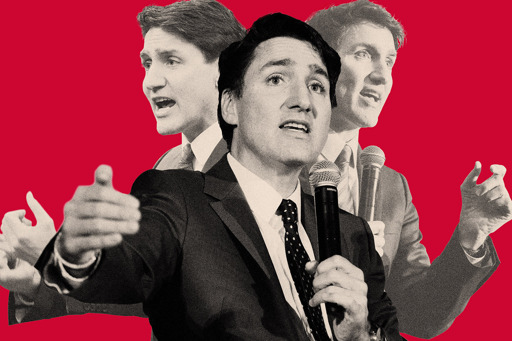The Liberal prognosis is grim. For Trudeau to stand a chance, the government will need a major policy pivot. The Liberals could harness some of the populist economic momentum by cracking down on monopolistic practices or opening the telecom sector to foreign investment. Trudeau could make a generational commitment to restoring the dream of homeownership to the middle class. He could articulate his positive vision for Canada, as the nation he described in his father’s eulogy: a place “where simple tolerance, mere tolerance, is not enough.” A nation animated by “genuine and deep respect” for Canadians of all origins, values, and beliefs. A nation we may yet become.
Whether he will do any of these things is, of course, anyone’s guess. For all I know, Trudeau will be swallowed by the anti-incumbent wave after all—or take cover long before it arrives. But we are not the United States. We are not Britain, France, or anywhere else. Our future is unwritten, its outlines discernible in polls, perhaps, but also in the relationship between a father and son, their half-realized dreams, and long, lonely walks through the snow.



This doesn’t fix anything, this just shows thewalrus.ca’s financial interests that is unaligned with the interests of most Canadians.
Foreign investors are not that different from venture capitalists, this decision would only pump up the line which would be in the interest of investors but for citizens this has a high potential to drive up local costs.
What do you suggest then? Because as of right now we pay some of the highest prices in th world for our telecom services. Allowing competitors to come in and seize a brand new (to them) market would 110% have a positive effect on customers
A couple of potential systems might involve subsidies and time-based temporary protections (similar to iframes in games) to incentivize the build up of domestic competitors.
Implementing a system that incentivizes the constant import of foreign goods and services would be the replication of Hong Kong’s mistake(before they got taken over by China and the CCP):
Increasing dependancy of external systems means the reduction of self-autonomy and independance especially when it comes to critical infrastructure such as internet and technology.
I see this as a fine balancing act as you don’t want to always depend on externalities but at the same time, the fear of foreign goods is a major cause for concern as it plays a part in the increase of racism and extreemism, while also destablizing the bridges of trust you have with others (which is def bad as you’d be placing your eggs all in one basket) cause you to become more susceptible to bad actors.
These complex systems makes me hesistant in the reckless recommendation in opening domestic markets to foreign competitors without further analysis as you don’t want untrustworthy entities from coming in as it would only perpetuate a winner-takes-all system thereby leading to an eventual collapse of the market with a monopoly at the end.
At the same time echo chambers are just as toxic and leads to monopolistic systems. And this is why the real solution is the dedicated research to find a balance in which I am not the top analyst to speak on.
TL;DR:
shit’s complicated because of the systems involved, the best solution will come from researching further
Whatever they’re doing (or not doing?) now seems to be working. We may be paying more than other countries but I can say my phone bill is lower than it’s ever been since the beginning of the smartphone age and I’m getting way more for those dollars too.
Edit: that being said, I do hear of people paying close to $100 for a phone plan. I don’t know how they just go along with that or what value they think they’re getting but it’s definitely not necessary to spend that much these days.
Unless I want no coverage, I’m paying $117/mo for a two phone plan with 2GB data. After pricing out all the options, I haven’t found a better plan in my area that actually gets reception.
Are you using a satellite phone or something unusual? If you’re on a “big 3” network there are definitely better plans than that.